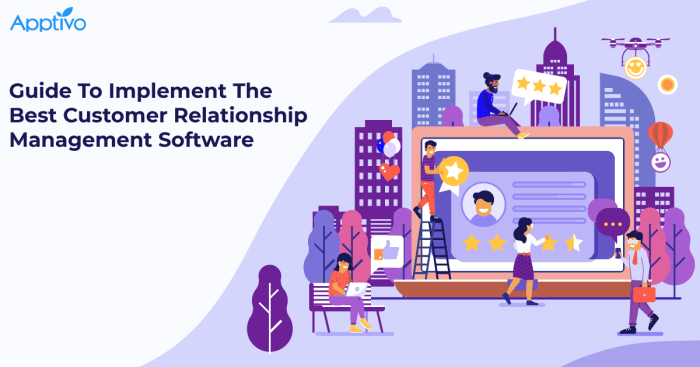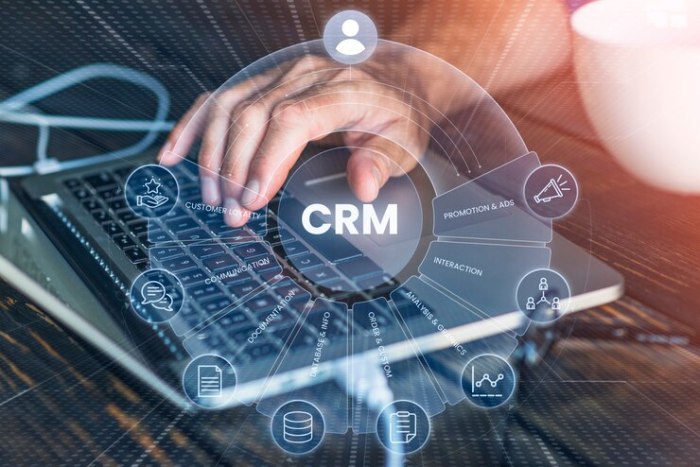CRM software for customer service is revolutionizing how businesses interact with their clients. Effective CRM systems streamline communication, track interactions, and ultimately improve customer satisfaction. This leads to increased loyalty, positive word-of-mouth referrals, and ultimately, stronger bottom lines. Understanding the capabilities and implementation of a CRM system is crucial for any organization aiming for superior customer service.
From simple contact management to sophisticated AI-powered chatbots, CRM solutions offer a wide range of functionalities. These features allow businesses to personalize interactions, anticipate customer needs, and proactively address potential issues. Choosing the right CRM system requires careful consideration of a company’s specific needs and size, ensuring seamless integration with existing workflows.
In today’s competitive landscape, providing exceptional customer service is paramount to success. Customer Relationship Management (CRM) software has evolved from a simple contact database to a powerful tool that streamlines operations, improves customer interactions, and ultimately boosts revenue. This comprehensive guide delves into the world of CRM software specifically tailored for customer service, exploring its features, benefits, and how to choose the right solution for your business.
Understanding the Role of CRM in Customer Service
CRM software acts as a central hub for all customer-related information. It consolidates data from various sources, including website interactions, email correspondence, social media engagement, and support tickets, providing a 360-degree view of each customer. This holistic perspective empowers customer service teams to personalize interactions, resolve issues efficiently, and build stronger relationships.
Key Features of CRM for Customer Service:, Crm software for customer service
- Ticketing System: A robust ticketing system allows for efficient tracking and management of customer inquiries, ensuring no request falls through the cracks. Features like automated routing, priority assignment, and customizable workflows enhance efficiency. Look for features like SLAs (Service Level Agreements) tracking to ensure timely responses.
- Knowledge Base Integration: Integrating a knowledge base allows agents to quickly access solutions to common issues, reducing resolution times and improving customer satisfaction. Self-service options, powered by the knowledge base, empower customers to find answers independently.
- Live Chat & Messaging: Real-time communication tools, such as live chat and integrated messaging platforms (e.g., WhatsApp, Facebook Messenger), facilitate immediate assistance and personalized support. These features improve customer engagement and satisfaction.
- Call Center Integration: Seamless integration with phone systems allows agents to access customer information during calls, providing context and improving the overall call experience. Features like call recording and call analytics offer valuable insights into agent performance and customer interactions.
- Customer Segmentation & Personalization: CRM systems allow for customer segmentation based on various criteria (demographics, purchase history, engagement level). This enables personalized communication and targeted support, fostering stronger customer relationships.
- Reporting & Analytics: Comprehensive reporting and analytics dashboards provide valuable insights into customer service performance, including key metrics such as resolution time, customer satisfaction (CSAT), and Net Promoter Score (NPS). This data-driven approach enables continuous improvement.
- Automation & Workflow Management: Automating repetitive tasks, such as assigning tickets and sending follow-up emails, frees up agents to focus on more complex issues and improve overall efficiency. Workflow management ensures consistent service delivery across all channels.
Benefits of Implementing CRM for Customer Service
The advantages of using CRM software for customer service are numerous and far-reaching:
- Improved Customer Satisfaction: Personalized interactions, faster resolution times, and readily available information contribute significantly to higher customer satisfaction levels.
- Increased Efficiency & Productivity: Automation, streamlined workflows, and easy access to customer information enhance agent productivity and overall team efficiency.
- Reduced Operational Costs: Improved efficiency translates to reduced operational costs associated with customer service, such as lower labor costs and reduced call handling time.
- Enhanced Team Collaboration: CRM systems facilitate seamless collaboration among team members, ensuring consistent service delivery and efficient knowledge sharing.
- Better Customer Retention: Strong customer relationships built through personalized support and efficient service lead to improved customer retention rates.
- Data-Driven Decision Making: Comprehensive reporting and analytics provide valuable data insights for informed decision-making regarding customer service strategies and resource allocation.
- Scalability and Flexibility: CRM systems can easily scale to accommodate business growth and adapt to changing customer needs.
Choosing the Right CRM Software for Your Business
Selecting the appropriate CRM software involves careful consideration of various factors:

Source: apptivo.com
- Business Size and Needs: Small businesses may benefit from simpler, more affordable solutions, while larger enterprises require more robust and scalable systems.
- Budget: CRM software comes in a wide range of pricing models, from subscription-based services to on-premise solutions. Consider your budget constraints when making a selection.
- Integration Capabilities: Ensure the CRM integrates seamlessly with your existing systems, such as email platforms, help desk software, and other business applications.
- User-Friendliness: Choose a CRM with an intuitive interface that is easy for your team to learn and use effectively. Consider the training and support offered by the vendor.
- Scalability and Flexibility: Select a system that can adapt to your business’s growth and changing needs. Consider future scalability requirements.
- Customer Support: Reliable customer support from the vendor is crucial for addressing any technical issues or questions that may arise.
Popular CRM Software Options for Customer Service
The market offers a wide array of CRM solutions. Some popular options include Salesforce Service Cloud, Zendesk, HubSpot Service Hub, Freshdesk, and Zoho CRM. Each platform offers unique features and capabilities, so it’s important to research and compare options based on your specific requirements.
Frequently Asked Questions (FAQ): Crm Software For Customer Service
- Q: What is the difference between CRM and customer service software? A: While the terms are often used interchangeably, CRM is a broader concept encompassing all aspects of customer relationships. Customer service software is a subset of CRM, focusing specifically on managing and improving customer support interactions.
- Q: How much does CRM software cost? A: Pricing varies greatly depending on the vendor, features, and number of users. Options range from free plans with limited features to enterprise-level solutions with significant costs.
- Q: How long does it take to implement CRM software? A: Implementation time depends on the complexity of the system and the size of your business. It can range from a few weeks to several months.
- Q: What are the key metrics to track with CRM for customer service? A: Key metrics include resolution time, customer satisfaction (CSAT), Net Promoter Score (NPS), first contact resolution rate, and average handling time.
- Q: Can CRM software integrate with my existing systems? A: Most modern CRM platforms offer robust integration capabilities with various business applications, including email, help desk software, and marketing automation tools.
Conclusion
Implementing the right CRM software can significantly enhance your customer service operations, leading to improved customer satisfaction, increased efficiency, and ultimately, business growth. By carefully considering your business needs, budget, and desired features, you can choose a solution that empowers your team to deliver exceptional customer experiences.
References
Call to Action
Ready to transform your customer service? Explore the CRM options mentioned above and find the perfect fit for your business. Start improving your customer interactions and boosting your bottom line today!
In conclusion, implementing a robust CRM system is no longer a luxury but a necessity for businesses striving for excellence in customer service. By centralizing customer data, automating tasks, and providing insightful analytics, CRM software empowers organizations to deliver personalized, efficient, and ultimately more satisfying customer experiences. The return on investment, both in terms of improved customer relationships and increased profitability, makes the strategic adoption of CRM a compelling decision for businesses of all sizes.

Source: emblemwealth.com
Effective CRM software is crucial for streamlined customer service, enhancing interactions and boosting loyalty. However, integrating this with project management capabilities can significantly improve operational efficiency. For a deeper dive into how this integration works, check out this helpful resource on crm and project management software , which ultimately allows for better allocation of resources and improved customer service delivery in the long run.
Ultimately, a well-integrated system leads to happier customers and a more productive team.
Quick FAQs
What are the common features of CRM software for customer service?
Common features include contact management, interaction tracking, case management, reporting and analytics, and integration with other business tools like email and phone systems.
How much does CRM software cost?
Pricing varies greatly depending on the vendor, features, and number of users. Options range from affordable cloud-based solutions to enterprise-level systems with significant upfront costs.
How long does it take to implement CRM software?
Implementation timelines vary depending on the complexity of the system and the size of the organization. Smaller businesses might see results within weeks, while larger enterprises may require months.
What are the key benefits of using CRM software?
Key benefits include improved customer satisfaction, increased efficiency, better sales performance, enhanced team collaboration, and valuable data-driven insights.
